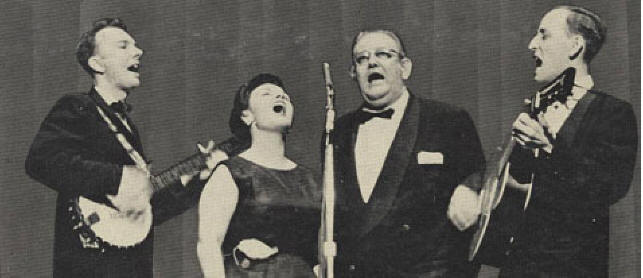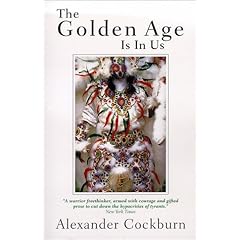 A little while ago, I tried to write something about the short stories of Lee Hays, the bass foundation of '50s folk group The Weavers and author of lyrics to songs such as "If I Had a Hammer" and "Kisses Sweeter Than Wine." That project stalled -- his stories are so simple and good and outside the normal frame of literary reference that I failed to find a language in which to write about them -- but in the meantime I've published an essay about Hays' life, radical politics, strange religion, and brilliant music in Oxford American's annual Southern music issue. My title was "Oh Yes, Oh Yes, My Darling!" but OA changed it -- without asking! -- to "The People's Singer." Oh, well. I strongly recommend going out to a store -- probably a big box bookstore, alas, since OA doesn't have a huge circulation -- and buying the magazine, which comes a CD comprised of songs by the various artists, past and present, whose stories are told therein. Almost always well-told, I think.
A little while ago, I tried to write something about the short stories of Lee Hays, the bass foundation of '50s folk group The Weavers and author of lyrics to songs such as "If I Had a Hammer" and "Kisses Sweeter Than Wine." That project stalled -- his stories are so simple and good and outside the normal frame of literary reference that I failed to find a language in which to write about them -- but in the meantime I've published an essay about Hays' life, radical politics, strange religion, and brilliant music in Oxford American's annual Southern music issue. My title was "Oh Yes, Oh Yes, My Darling!" but OA changed it -- without asking! -- to "The People's Singer." Oh, well. I strongly recommend going out to a store -- probably a big box bookstore, alas, since OA doesn't have a huge circulation -- and buying the magazine, which comes a CD comprised of songs by the various artists, past and present, whose stories are told therein. Almost always well-told, I think. A particular highlight in this issue is "Hype Machine," by Bill Wasik. I've known Bill for several years now as my editor at Harper's, but like all the best editors he turns out to have been quietly developing his own voice as a writer, and, of course, it turns out to be so smart and funny and perceptive that I feel bad for having made him wade through my messes over the years. "Hype Machine," ostensibly about a band called The Annuals, is an excerpt from his forthcoming book, My Crowd, an unclassifiable work of narrative nonfiction, gag, hoax, subtle ranting, and cultural criticism.
I've yet to read the rest of the issue; UPS seems to have misplaced my copies.
In the meantime, though, I'm obliged to disclose what appears to be a misunderstanding in my account of Lee Hays. Based on various textual sources, I thought Lee was gay, that his homosexuality, closely guarded in the rural south of his youth, perhaps informed the empathy, hope, and anger so evident in his music, and that it was not controversial to say so. What I thought was the evidence was sufficiently persuasive for Oxford American's fact checkers, too. But -- I've learned I read the record incorrectly. A source close to Lee Hays while he was living (he died in 1981) called as soon as he read the story to tell me that Hays' sexual persuasion, asexual if anything, did not inform his music. This source said that my mischaracterization would have made Lee very unhappy. Doing so certainly wasn't my intention, which is why I've no hesitation in saying: I was wrong. I'm an enormous admirer of Lee's life and work. When OA sent me a list of Southern musicians to consider for the music issue, I proposed instead Lee Hays, whose name meant nothing to them. I want his name to mean a lot, to as many people as possible. That led me to scrutinize the available sources on Lee's life as closely as I could to produce a full portrait of the man. Evidently, I misread some clues.
Of course, my mistake raises all kinds of interesting questions I'm going to think about if I keep writing about musicians' lives. Why did I assume sexual persuasion is relevant to the life of an artist? Can it be irrelevant? How does a biographer determine when it is, when it isn't, and when the evidence is too thin to decide?
That said, this time I got it wrong. I hope the rest of the essay goes some distance to redeem my mistake by inspiring a few readers to go straight to the best source, the wonderful music of Lee Hays. The best record to start with, I think, is The Weavers at Carnegie Hall, a live recording of their 1955 comeback concert after the anti-communist blacklist had nearly destroyed their musical careers.







.jpg/543px-Hieronymus_Bosch_-_The_Garden_of_Earthly_Delights_-_Garden_of_Earthly_Delights_(Ecclesia's_Paradise).jpg)